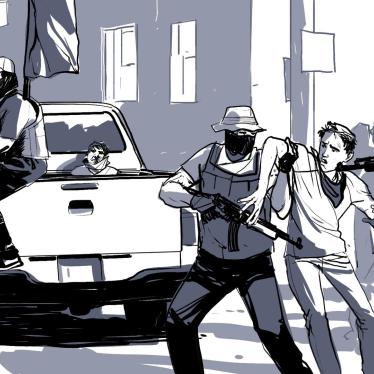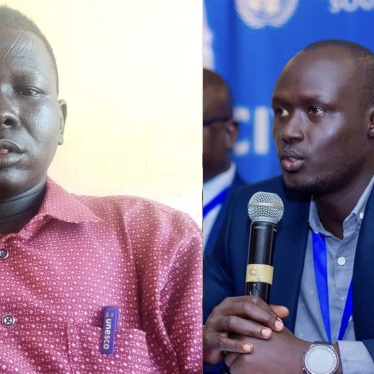Washington, D.C., June 26, 2019
Carlos Holmes Trujillo
Foreign Minister of Colombia
Bogota - COLOMBIA
Dear Chancellor,
I am writing in advance of the Organization of American States (OAS) General Assembly meeting in Medellin this week to share with you the findings of Human Rights Watch’s recent report on the crackdown in Nicaragua, and respectfully urge you, as President of the General Assembly, to lead efforts to redouble the pressure on the Nicaraguan government to curb human rights violations through the concrete steps outlined in this letter.[1]
The OAS has been closely monitoring the situation in Nicaragua since the creation, in August 2018, of the OAS Permanent Council Working Group on Nicaragua. It has held six meetings so far and produced 21 press releases and four reports. OAS Secretary General Luis Almagro has repeatedly voiced concern regarding human rights violations in the country. More recently, on May 21, 2019, the OAS Permanent Council adopted a resolution opening the door to evaluate Nicaragua’s compliance with the Inter-American Democratic Charter.[2]
This sustained pressure has sent a powerful message to the Nicaraguan government that its egregious human rights violations will not be tolerated in the region. It is now time to step up international pressure through additional concrete steps—including targeted sanctions, the suspension of funding and other support to the National Police of Nicaragua, and increased pressure for accountability. These steps are needed to curb egregious violations, allow Nicaraguans to return from exile, end censorship, and restore judicial independence in Nicaragua.
Our June 2019 report documented a brutal crackdown by the National Police and heavily armed pro-government groups against protesters that left more than 300 people dead and more than 2,000 injured. In the ensuing weeks and months, hundreds were arrested as authorities increased their repression of dissent. Many detainees were subject to serious abuses that in some cases amounted to torture—including electric shocks, severe beatings, nail removal, asphyxiation, and rape. Some who were injured were reportedly denied medical care in public health centers and doctors who did provide care said they suffered retaliation. Detainees have also been subject to prosecutions for alleged crimes in connection with their participation in anti-government protests or their role in social movements challenging the government. These prosecutions were marred by serious violations of due process and other fundamental rights.
The government has also targeted those who have reported on the crackdown in the streets and subsequent abuses. It has raided the offices of independent media outlets, filed criminal charges against two journalists, cancelled the legal registration of nine civil society organizations, and expelled foreign journalists and international human rights monitors from the country.
The May 2019 Permanent Council resolution invoked articles 18-20 of the Inter-American Democratic Charter, which allows OAS member states to adopt “diplomatic initiatives” when circumstances may “seriously impair the democratic order of a member state.” It urged the Nicaraguan government to take a series of steps, including the unconditional release by June 18 of all detainees accused of committing crimes in the context of anti-government protests.[3] It also resolved that the Permanent Council would advance a “collective assessment of the situation in Nicaragua” to be brought forward during the General Assembly meeting in Medellin.
The Permanent Council’s call for the unconditional release of detainees has not been met. According to the Interior Ministry, between March 15 and June 10, 2019, the Nicaraguan government released 392 people who were imprisoned for “committing crimes against public security and crimes against the public peace.” Many of these individuals, however, as of June 19, remained under house arrest and subject to criminal prosecution, and 100 additional individuals were arrested and released in March in the context of new demonstrations.[4] On June 17, the Inter-American Commission on Human Rights (IACHR) reported that dozens of people who were detained in the context of protests remained behind bars.[5]
Moreover, these releases should not overshadow the fact that, according to our research, not a single police officer is under criminal investigation for the atrocities documented by Human Rights Watch. Instead of ensuring that those responsible are brought to justice, President Daniel Ortega has promoted officers implicated in human rights violations.
Ongoing international pressure is clearly needed. We respectfully urge you to call on OAS member states during the upcoming General Assembly meeting to adopt a resolution committing their governments to the recommendations outlined below, and to assess the effectiveness of these and other initiatives in light of the Inter-American Democratic Charter process.
Recommendations
To ensure accountability for, and to deter the repetition of the human rights abuses documented in Human Rights Watch’s report, it is critically important to intensify international pressure on the Nicaraguan government. Specifically, OAS member states should:
- Impose targeted sanctions, including travel bans and asset freezes, on senior government officials who bear responsibility for gross human rights violations, including but not limited to:
- President Daniel Ortega, who is supreme chief of the National Police and has sweeping powers, including to “command” the police at his will and dismiss police chiefs when they disobey his orders;
- Retired General Aminta Granera, former chief of the National Police, who was the head of the force until she was replaced by General Francisco Díaz;
- General Francisco Díaz, chief of the National Police, who is believed to have exercised significant control over the force first as deputy director and in his current position. (Díaz has already been sanctioned by the US and Canadian governments);
- General Ramon Avellán, deputy chief of the National Police, who acted as the highest-ranking member of the National Police in Masaya, where police and armed pro-government gangs brutally repressed protesters;
- General Jaime Vanegas, inspector general of the National Police, who is required under Nicaraguan law to investigate alleged rights violations by police officers and sanction those responsible;
- General Luis Pérez Olivas, chief of the Direction of Judicial Assistance (DAJ, also known as El Chipote), which is the “main place” where authorities perpetrated egregious abuses against anti-government demonstrators, according to the Office of the High Commissioner for Human Rights; and,
- General Justo Pastor Urbina, chief of the Department of Special Operations (DOEP, by its Spanish acronym), which played a “central role” in the repression throughout the country, according to the Interdisciplinary Group of Independent Experts of the Inter American Commission of Human Rights.
- Suspend all cooperation with Nicaraguan security forces, including through transfers of funds, weaponry, ammunition, or equipment that risks being used in the commission of violent abuses against government opponents, as well as by eliminating all trainings, courses, or exchanges with them;
- Urge Nicaragua to create a special unit that—acting together with the Interdisciplinary Group of Independent Experts of the IACHR—will oversee investigating the most atrocious crimes that have occurred in the context of the protests; and
- Exercise criminal jurisdiction, to the extent permitted under domestic law, over any Nicaraguan officials responsible for torture, in accordance with article 5 of the UN Convention Against Torture and the Inter American Convention to Prevent and Punish Torture.
Thank you in advance for your attention to this letter. Please do not hesitate to contact us if we can provide any additional information on this very important matter. We look forward to working with you to support the people of Nicaragua.
Best regards,
José Miguel Vivanco
Human Rights Watch
CC:
Luis Almagro, OAS Secretary General
H.E. Jennifer M.A. Loten, Permanent Representative of Canada to the OAS and President of the OAS Permanent Council Working Group on Nicaragua
H.E. Hernán Salinas Burgos, Permanent Representative of Chile to the OAS and Vice-President of the OAS Permanent Council Working Group on Nicaragua
[1] Human Rights Watch, Crackdown in Nicaragua: Torture, Ill-Treatment, and Prosecutions of Protesters and Opponents, June 19, 2019, https://www.hrw.org/report/2019/06/19/crackdown-nicaragua/torture-ill-treatment-and-prosecutions-protesters-and . Unless noted otherwise, the sources for information included in this letter are cited in the report.
[2] OAS Permanent Council Resolution CP/RES.1128/19, May 21, 2019, https://www.oas.org/es/council/CP/documentation/res_decs/ (accessed June 25, 2019).
[3] Ibid. The resolution also called on the Ortega government to allow the Inter-American Commission on Human Rights (IACHR) to conduct “effective work” in the country; ensure free, fair transparent and legitimate elections with the presence of international observers; ensure the respect of fundamental rights including free speech and the freedom from being arbitrarily detained; and guarantee the safe return of Nicaraguans forced into exile during the crisis.
[4] Of the individuals released, 286 were released to house arrest or under another restrictive regime; charges remained levied against them. The remaining 106 were released pursuant to an Amnesty Law (Law No. 996) that came into force on June 10.
[5] “The IACHR urges Nicaragua to release all political prisoners” (CIDH insta a Nicaragua a que deje en libertad a todos los presos políticos), Radio Televisión Martí, June 18, 2019, https://www.radiotelevisionmarti.com/a/cidh-insta-a-nicaragua-a-que-deje-en-libertad-a-todos-los-presos-pol%C3%ADticos/240889.html (accessed on June 25, 2019).





